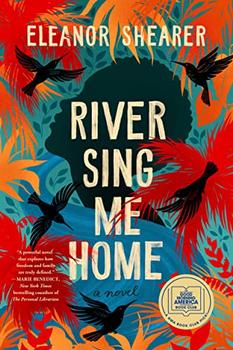Summary | Excerpt | Reading Guide | Reviews | Beyond the Book | Read-Alikes | Genres & Themes | Author Bio

This article relates to River Sing Me Home
 The Slavery Abolition Act, also known as the Emancipation Act, was an act of Parliament that legally abolished slavery in most British colonies. The act received Royal Assent on August 28, 1833, and took effect the following year on August 1. In Eleanor Shearer's debut novel, River Sing Me Home, this event serves as a catalyst for the plot, which follows Rachel, a previously enslaved woman in Barbados, on a journey she undertakes after abolition to find her five children who were sold away from her.
The Slavery Abolition Act, also known as the Emancipation Act, was an act of Parliament that legally abolished slavery in most British colonies. The act received Royal Assent on August 28, 1833, and took effect the following year on August 1. In Eleanor Shearer's debut novel, River Sing Me Home, this event serves as a catalyst for the plot, which follows Rachel, a previously enslaved woman in Barbados, on a journey she undertakes after abolition to find her five children who were sold away from her.
The main aim of the act was to dismantle the plantation system in the Caribbean. The evolving international economy had rendered the sugar production industry in the region less efficient and profitable in recent years. There was also increasing pressure on the British government to end slavery in its colonies from both abolitionists in Britain and large-scale slave revolts on the islands. These included Bussa's Rebellion in Barbados in 1816, involving hundreds of enslaved people on multiple estates who attempted to overthrow the planter class, and the Demerara Rebellion of 1823, in which over 10,000 enslaved in Demerara-Essequibo (part of modern-day Guyana, on South America's North Atlantic coast) staged an uprising.
However, as soon becomes clear and crucial to the unfolding of events in Shearer's novel, the act only abolished slavery nominally in many of the colonies it affected. In the Caribbean countries apart from Antigua and Barbuda, as well as in Guyana, "freed" slaves were still expected to continue their labor under a system of "apprenticeship," which forced them to work a certain number of hours each week for their former owners. Supposedly, this was meant to offer a set period of time (four to six years, depending on a worker's position) for the formerly enslaved and plantation owners to transition to a free market system rather than one dependent on slave labor. Apprentices would receive a wage and had the option of working elsewhere additionally, but they were poorly compensated and threatened with punishment if they refused to abide by the new system's rules. In Rachel's case, this makes her decision to flee the plantation where she has been enslaved an act of disobedience that puts her in grave danger, even though emancipation has allegedly already occurred.
In short, not much was improved in the everyday existence of those forced to labor, and they were still effectively treated as slaves. In fact, some of the changes that ensued made life worse for apprentices, and particularly for women. Historical accounts suggest that women were expected to perform heavier labor after abolition. Those who were mothers also had to contend with working their required hours on top of spending increased time caring for their children; under slavery, they had depended on a system of collective childcare in which older women would look after children while their mothers were working, but this system was no longer available under apprenticeship. Some women were also faced with the burden of doing extra work in order to keep their children from having to labor as apprentices themselves.
Due to continued pressure from abolitionists, general unrest under the apprenticeship system and a failure of the system to fulfill its intended purposes, apprenticeship ended earlier than anticipated, in 1838.
According to Shearer, River Sing Me Home is inspired by the true stories of mothers like Rachel, who, rather than waiting out the apprenticeship system, went looking to be reunited with their children after emancipation.
The Emancipation Statue, commemorating the end of slavery in Barbados, via Wikimedia Commons
Filed under People, Eras & Events
![]() This "beyond the book article" relates to River Sing Me Home. It originally ran in February 2023 and has been updated for the
August 2023 paperback edition.
Go to magazine.
This "beyond the book article" relates to River Sing Me Home. It originally ran in February 2023 and has been updated for the
August 2023 paperback edition.
Go to magazine.
We should have a great fewer disputes in the world if words were taken for what they are
Click Here to find out who said this, as well as discovering other famous literary quotes!
Your guide toexceptional books
BookBrowse seeks out and recommends the best in contemporary fiction and nonfiction—books that not only engage and entertain but also deepen our understanding of ourselves and the world around us.